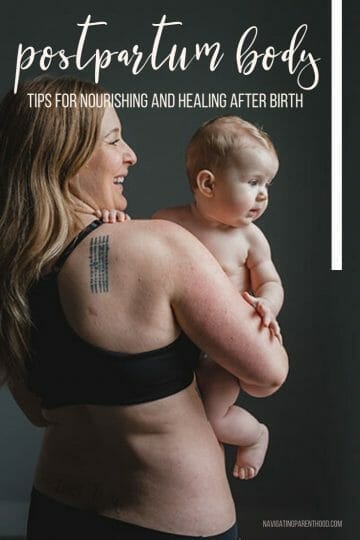Tips for Nourishing Your Postpartum Body
Pregnancy and birth are some of the hardest things your body will do. Even if you didn’t face any major setbacks, your body will need time to recover. Nourishing your postpartum body while also caring for your newborn can feel like a major challenge. In addition to excitement and joy, the fourth trimester can be difficult, and a little scary to navigate, especially for first-time moms. Fatigue, constipation, weight gain, anxiety, pelvic pain, and hair loss are just some of the realities moms can face. Coupled with a lack of sleep, the whirlwind of the fourth trimester can wreak havoc on your physical and mental wellbeing. Compared to pregnancy when your health is closely monitored, many women feel a lack of attention from health care providers after giving birth, which is why it’s important to learn ways to keep yourself healthy through the ups and downs of the fourth trimester. Here are a few tips and tricks I recommend.

Give yourself time to heal
Pregnancy takes a toll on your body. In some cultures, women take 30-40 days to rest after birth, while family and their community help care for the baby. In the United States, there is an unrealistic expectation that women should instinctively know what to do and “bounce back” immediately. This can be damaging to the health of mothers and their babies. While some women feel mostly recovered after around 6-8 weeks, it can take significantly longer, especially for C-section births.
Limit processed foods
After 9 months of food restriction, everything is back on the table . . . kind of. The fourth trimester is not the time to deprive yourself, however, try to minimize your intake of processed, sugar-rich foods. It’s common for blood sugar levels to fluctuate after birth, especially if you had gestational diabetes during pregnancy. Eat every 2-3 hours and pair complex carbohydrates such as whole grain bread and brown rice, with lean protein to stabilize your blood sugar levels. The added protein will make you feel fuller, supporting healthy weight control. Meal delivery services specific to the postpartum period can be really helpful when figuring out what to eat to support your healing and nutrient needs.

Eat iron-rich and calcium-rich protein
To aid your body’s natural repair process, you should try to include lean, nutrient-rich protein in your diet. Blood loss during childbirth can set some women up for iron deficiency during the postpartum period. Nourish your body with foods that are high in iron. This includes lean cuts of red meat (limit to 1-2 servings per week), fish, broccoli, spinach, swiss chard, and legumes. Drinking a vitamin C rich drink, such as orange juice, at the same time will increase absorption in the gut.
Estrogen levels remain low after birth, especially during breastfeeding. Together with Vitamin D and calcium, this hormone plays a role in bone health. While the effects appear temporary, some women are susceptible to bone loss during this time which can increase the risk of injury (3). Keep your bones strong by eating two servings of calcium-rich foods per day. Milk, low sugar Greek yogurt, cheese, kefir, and soybeans are good options. You should avoid eating calcium-rich foods at the same time as iron-rich foods to maximize your body’s absorption of these nutrients.
Ditch the scale
Drinking lots of water in the weeks following birth is an important component of postpartum recovery. Water makes up a large proportion of breastmilk so a continuous supply is needed to support production. Staying hydrated will also make you feel more energized. Aim for 64 ounces per day, that’s around 8 glasses. Plain water is best, but fluids contained in food also count. As do non-water liquids such as tea and coffee. Limits on caffeine intake remain the same as during pregnancy. Try not to exceed 200mg per day, that’s the same as two standard cups. Keep in mind that caffeine’s stimulatory effects are more pronounced in newborns and preterm infants so best to go easy in the first few weeks.

Continue prenatal vitamins
Finding time to prepare healthy meals can be a challenge. To cover your bases, I recommend that you continue taking your prenatal vitamins at least for the first few months.
The micronutrient composition of breastmilk changes depending on the mother’s diet. This effect is more pronounced for nutrients that are not stored in the body in large quantities, such as Vitamin B12, Vitamin C, zinc, selenium, and iodine. Taking daily prenatal vitamins will support your recovery and ensure that your breastmilk has the nutrients your baby needs. This is particularly important for moms with restrictive diets, such as vegans and vegetarians. A history of gastric bypass surgery prior to pregnancy or celiac disease can also increase the risk of deficiencies postpartum. Some studies have shown that pregnant women with low levels of Vitamin D report higher rates of postnatal depression symptoms (1, 2). Taking a prenatal can help to keep your Vitamin D levels within a normal range and defend against mood dips.
Get Rest
As the mom to a 10-month-old who regularly wakes up several times a night, I am familiar with sleep deprivation. You’ll probably never sleep for as long or as well as you did before your baby was born, but prioritizing sleep during the first few weeks is important. Research has shown that stress, hormonal shifts, and changes in the brain during postpartum make new moms especially susceptible to insomnia. This can increase the risk of postpartum depression. To improve the quality and quantity of your sleep try some of the following:
Skip alcohol. Aside from improving your sleep quality, skipping or moderating your alcohol intake is the safest option for your baby. The CDC recommends breastfeeding women limit themselves to one standard drink per day and wait 2 hours before breastfeeding.
Limit caffeine. Reducing your caffeine intake, especially in the afternoon, will help support better sleep.
Try to sleep when your baby sleeps. Power napping during the day can help you get some well-deserved rest.
Above all else, having a strong support team in place during the first few weeks can make all the difference. Stay in touch with your obstetrician-gynecologists or other obstetric care providers frequently. Let them know how you are feeling and seek help if things aren’t going to plan.


Tamsin Jordan is a Registered Dietitian and wellness expert based in New York City. She specializes in women’s health, including infertility, pregnancy, and postpartum care at ROSH maternal & fetal medicine clinic. She also works with bariatric surgery patients and those with diabetes and digestive issues. Tamsin writes about a range of nutrition and wellness topics on her blog, tamsinjordan.com, and Instagram, @nutritionbytamsin.
References
(1)Accortt, E. E., Schetter, C. D., Peters, R. M., & Cassidy-Bushrow, A. E. (2016). Lower prenatal vitamin D status and postpartum depressive symptomatology in African American women: Preliminary evidence for moderation by inflammatory cytokines. Archives of Women’s Mental Health, 19(2), 373-383.
(2)Robinson, M., Whitehouse, A. J., Newnham, J. P., Gorman, S., Jacoby, P., Holt, B. J., . . . Hart, P. H. (2014). Low maternal serum vitamin D during pregnancy and the risk for postpartum depression symptoms. Archives of Women’s Mental Health, 17(3), 213-219.
(3) Grizzo, F., Alarcão, A., Dell’Agnolo, C., Pedroso, R., Santos, T., Vissoci, J., . . . Pelloso, S. (2020). How does women’s bone health recover after lactation? A systematic review and meta-analysis. Osteoporosis International, 1-15.


Very helpful information Thank You. It all helps to make sense of that period in a new Mums life.
So glad this could help!